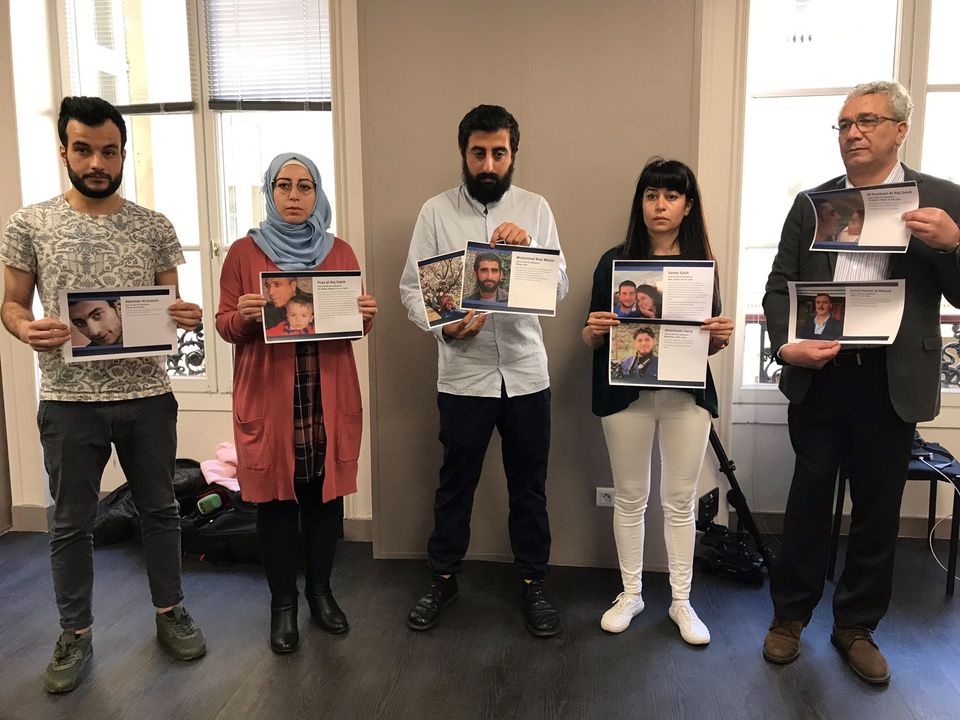
Families of ISIS Missing Deserve Truth
The ‘Coalition of Families of Those Kidnapped by ISIS’, a new organization of Syrian families based in Paris, held a joint news conference with Human Rights Watch on May 14 calling on the anti-ISIS coalition to create a formal mechanism to address the issue of missing persons in Northeast Syria. The families in the coalition are among thousands of families across Syria who continue to desperately search for details on what has happened to relatives that were detained, kidnapped, or forcibly disappeared at the hands of the Syrian government, ISIS and other armed groups. However, this group represents the first organized effort by families of those who went missing under ISIS specifically, and they face unique challenges.
In Northeast Syria, many had hoped that ISIS’s territorial defeat by U.S.-led coalition forces would lead to news of their loved ones. Chillingly, prisons and detention facilities captured from ISIS were found empty of detainees, while one after another, mass graves have been uncovered in former areas of ISIS rule. Families say they are finding it difficult to obtain information on these sites and where to report information on their missing loved ones. Local authorities exhuming graves are doing their best with severely limited resources and training, yet key forensic information on the identities of individuals are being lost in the process.
As part of the larger fight against ISIS, the anti-ISIS coalition bears a responsibility to support long-term reconciliation and healing for local communities. SJAC stands with the families and Human Rights Watch in their calls for the coalition to prioritize the issue of missing persons. This will require a comprehensive missing persons program, including the creation of a database congregating reports of missing and relevant information that could help identify victims. It was also require extensive material resources and technical training for those exhuming graves, to ensure that evidence is carefully documented and stored, and to allow investigators to begin the long process of identification. A coordinating entity should be established to act as a bridge between investigations of the missing and of mass graves, as well as maintain an open line of communication with families regarding the state of investigations.
The creation of the new coalition of families on Tuesday is an important step in launching such a comprehensive program. The inclusion of families in every step of the investigation will be key to success. They are not only important sources for personal information on missing persons, but victims themselves with the right to be fully integrated into investigations. Past conflicts have shown that advocacy efforts by families are critical for successful investigations, post-conflict reconciliation and healing. Most recently, families of those who went missing in Lebanon’s civil war successfully pushed for the passage of a law in 2018 that acknowledges families’ right to truth. It also plans to create a commission to investigate the missing–almost thirty years after the end of the conflict. These long-term efforts highlight both the enduring grief brought by disappearances, and the unavoidable need for genuine truth finding efforts.
However, investigators must also be honest about the limitations of forensic investigations. Immediate identification of bodies from documents, personal effects or clothing will likely be minimal, while forensic investigations can often take years. Furthermore, not all missing persons can be identified. It is inevitable that some families’ efforts will end in vain. Undue expectations and false hope for families will induce further suffering. Furthermore, participation in exhumations and investigations will likely be re-traumatizing, which means families will need adequate psychological support.
The international community and coalition against ISIS must act quickly to help preserve evidence, support families, and address the legacy of ISIS’s crimes. The critical information needed to identify the bodies of the missing are quickly being lost and destroyed as thousands of bodies are being exhumed with minimal documentation. With this information goes the last best chance for many families to learn the fate of their loved ones. The families of the missing will carry their suffering long after their conflict, particularly in the absence of closure and justice. They deserve a transparent process and a chance to learn the truth.